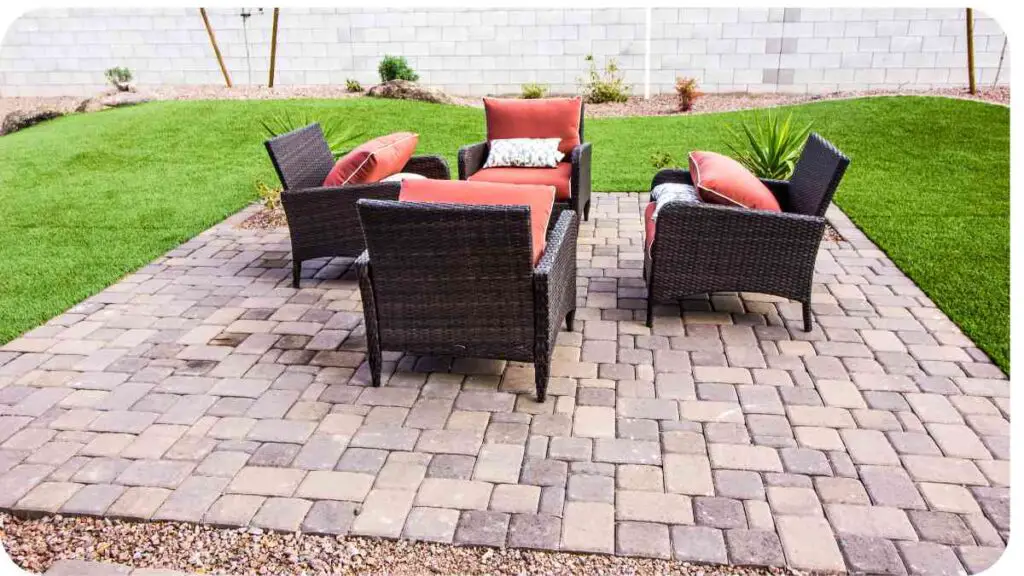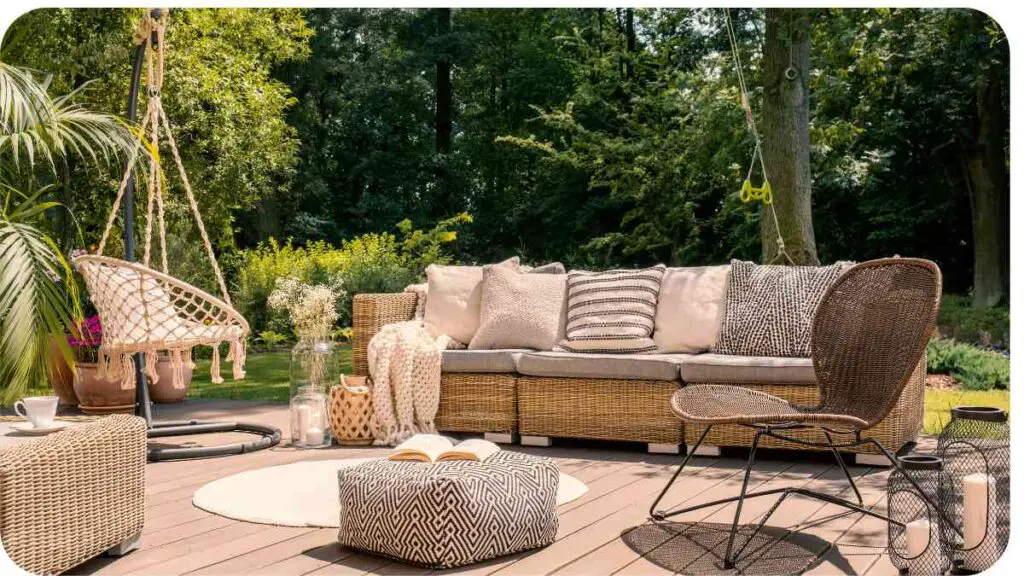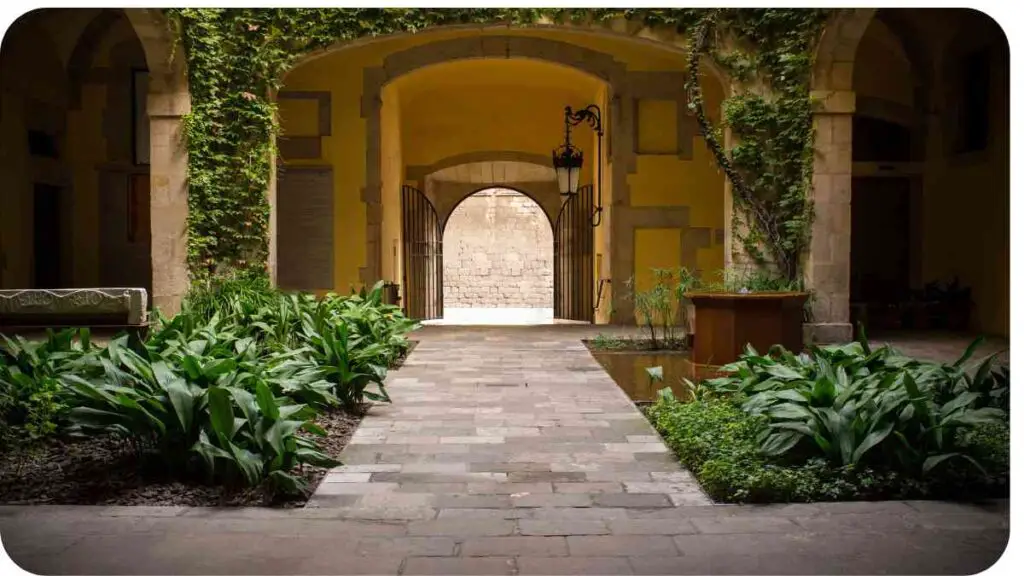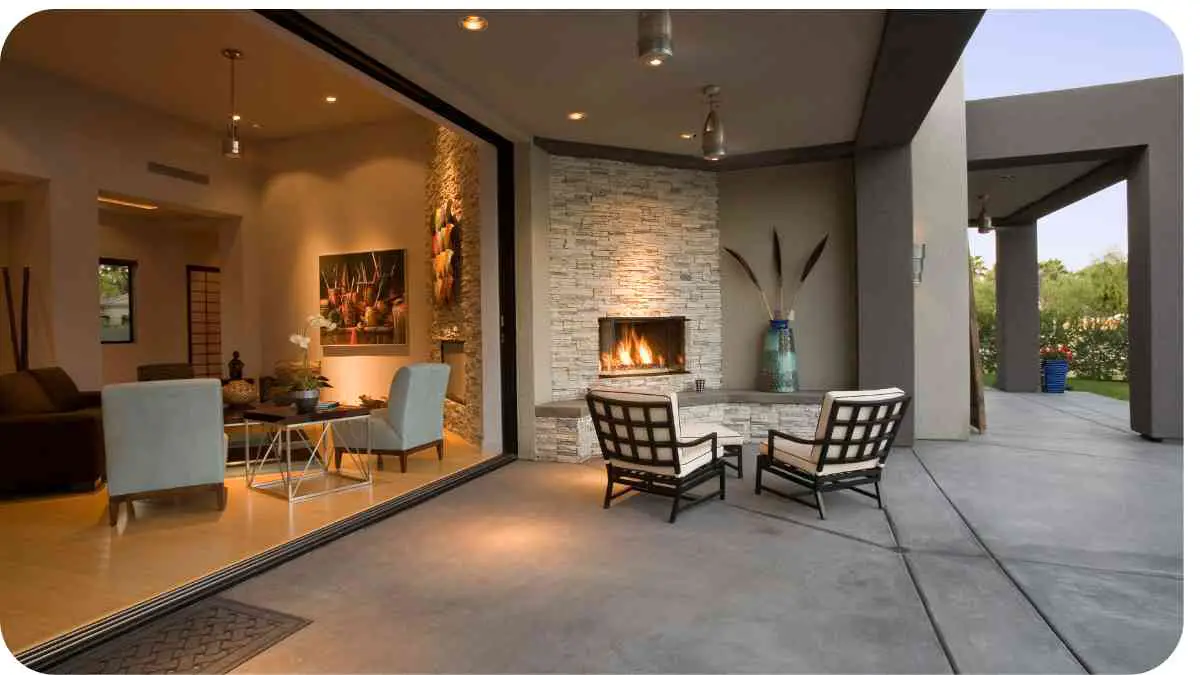Ever tried to relax on your patio only to be interrupted by noisy neighbors or street traffic? If you’re struggling with how to mute a patio, you’re not alone. Noise can seriously impact your outdoor enjoyment, but don’t worry there are plenty of ways to create a serene outdoor space.
Whether it’s for peaceful evenings or lively gatherings, finding the right solutions can make a huge difference.
In this guide, we’ll dive into effective strategies to reduce noise on your patio, from simple DIY fixes to professional solutions. Let’s get started on transforming your noisy patio into a quiet retreat.
| Key Takeaways |
|---|
| Combining multiple strategies, such as sound barriers, landscaping, and soft materials, is the most effective way to mute a patio. |
| Outdoor sound barriers like fences and curtains can significantly reduce noise levels. |
| Dense hedges, trees, and greenery act as natural sound absorbers and blockers. |
| Adding soft materials, such as outdoor rugs and cushions, can help absorb and reduce patio noise. |
| Specialized soundproofing techniques and materials, such as acoustic panels, offer high effectiveness for noise reduction. |
| DIY solutions, like homemade sound barriers and repurposing materials, can be budget-friendly options. |
| Consulting acoustic experts or hiring professional contractors can provide customized and high-quality noise reduction solutions. |
| Regular maintenance and monitoring of noise levels are essential to keep your patio quiet. |
Understanding Noise on Patios

Common Sources of Patio Noise
Patios can be exposed to various noise sources, making it hard to enjoy a quiet space. Common culprits include:
- Street Traffic: Cars, motorcycles, and public transport can create constant background noise.
- Neighbor Activities: Loud conversations, music, or parties from nearby homes.
- Wind and Weather: Rustling leaves and rain can sometimes add to the noise.
- Animals: Barking dogs or chirping birds can be unexpectedly loud.
For a relaxing outdoor retreat, consider affordable shade patio covers that not only provide relief from the sun but also add a touch of elegance to your patio. Enhance comfort and style while keeping cool.
Impact of Noise on Enjoyment
Noise can be a major buzzkill. It disrupts conversations, disturbs relaxation, and can even make outdoor dining less enjoyable. Studies have shown that excessive noise can also lead to increased stress levels. So, muting your patio not only enhances comfort but also contributes to better overall well-being.
Assessing Your Patio Noise
Measuring Noise Levels
Before tackling the noise, it’s essential to measure it. Use a decibel meter or a smartphone app designed for this purpose. Regular readings will help you gauge the effectiveness of your noise reduction efforts.
| Noise Level (dB) | Description |
|---|---|
| 30-40 | Quiet (e.g., library) |
| 40-60 | Moderate (e.g., conversation) |
| 60-80 | Loud (e.g., traffic) |
| 80+ | Very loud (e.g., chainsaw) |
Identifying Key Noise Sources
Pinpointing the exact sources of noise will help you address them more effectively. Walk around your patio and listen carefully. Note whether the noise is coming from the street, neighbors, or natural elements.
Creating a cozy covered patio with a fire pit can transform your outdoor space into a charming retreat. Enjoy warmth and ambiance, making your patio the perfect spot for gatherings and relaxation.
Effective Ways to Mute a Patio

Using Outdoor Sound Barriers
Fence Options
Fences can be a practical solution to block noise. Consider the following types:
| Fence Type | Description | Pros | Cons |
|---|---|---|---|
| Wood | Traditional and customizable | Aesthetic, easy to install | Requires maintenance |
| Vinyl | Durable and low-maintenance | Weather-resistant, easy to clean | Less natural appearance |
| Composite | Made from recycled materials | Long-lasting, low maintenance | Can be expensive |
Outdoor Curtains
Outdoor curtains offer a stylish way to block noise. They’re typically made from heavy fabrics that can absorb sound.
Implementing Landscaping Solutions
Hedges and Bushes
Landscaping can be a natural and effective way to reduce patio noise. Hedges and bushes act as living barriers that absorb and block sound. Here’s how they help:
| Plant Type | Characteristics | Benefits |
|---|---|---|
| Boxwood | Dense, evergreen | Excellent for privacy and noise reduction |
| Arborvitae | Tall, narrow, evergreen | Provides good coverage and sound barrier |
| Holly | Thick foliage, evergreen | Adds aesthetic appeal and noise reduction |
Trees and Greenery
Incorporating trees and greenery into your patio can also help. Trees with dense canopies can provide substantial sound insulation.
To ensure your outdoor structures last, follow essential weatherproofing tips that protect them from harsh elements. This guide will help you maintain and extend the life of your outdoor investments.
| Tree Type | Characteristics | Benefits |
|---|---|---|
| Leyland Cypress | Fast-growing, dense | Excellent for privacy and noise reduction |
| Pine | Tall, evergreen | Adds height and sound buffer |
| Maple | Broad, leafy canopy | Offers shade and noise reduction |
Adding Soft Materials
Outdoor Rugs
Outdoor rugs can help absorb sound and reduce noise. They are particularly effective on hard surfaces like concrete or tile.
| Rug Type | Material | Benefits |
|---|---|---|
| Wool | Natural, soft | Good for sound absorption, durable |
| Synthetic Fiber | Man-made, durable | Easy to clean, weather-resistant |
Cushions and Upholstery
Adding cushions and upholstered furniture can also help. Soft materials absorb sound, making your patio quieter and more comfortable.
| Material | Characteristics | Benefits |
|---|---|---|
| Outdoor Fabric | Weather-resistant, soft | Enhances comfort and noise absorption |
| Foam | Cushiony, supportive | Provides a softer, quieter surface |
Soundproofing Techniques
Acoustic Panels
Acoustic panels are designed to absorb sound and reduce echo. They can be a great addition to a patio, especially if it’s enclosed.
Extending your covered patio can significantly enhance your outdoor living. Discover creative ways to add more space and functionality, making your outdoor area more enjoyable and versatile.
| Panel Type | Material | Benefits |
|---|---|---|
| Fabric-Wrapped | Soft fabric | Effective sound absorption |
| Perforated Wood | Wood with holes | Stylish and functional |
Specialized Soundproofing Materials
There are various materials designed specifically for soundproofing. These can be used in combination with other methods for best results.
| Material | Description | Benefits |
|---|---|---|
| Mass Loaded Vinyl | Heavy, flexible | High effectiveness in blocking sound |
| Acoustic Caulk | Seals gaps and cracks | Enhances soundproofing by reducing leaks |
DIY Patio Mute Solutions
Homemade Sound Barriers
If you’re into DIY projects, you can create your own sound barriers. Simple materials like wooden pallets or old doors can be repurposed to block noise.
| Material | Use | Benefits |
|---|---|---|
| Wooden Pallets | Stack as barriers | Easy to assemble, cost-effective |
| Old Doors | Hang or install | Provides solid noise block |
Repurposing Materials
Think creatively about materials you already have. Old blankets, rugs, or even unused furniture can be used to create makeshift noise barriers.
Professional Solutions and Services
Consulting with Acoustic Experts
For a more tailored approach, consulting with acoustic experts can provide customized solutions based on your patio’s specific needs.
| Service | Description | Benefits |
|---|---|---|
| Acoustic Evaluation | Professional assessment of noise issues | Provides targeted recommendations |
| Design Consultation | Personalized design advice for soundproofing | Ensures effective solutions tailored to your space |
Hiring Soundproofing Contractors
For comprehensive soundproofing, hiring professionals can ensure high-quality results. Contractors can handle installation and offer warranties on their work.
To keep your patio furniture in top shape during colder months, learn the best methods for protecting patio furniture. Ensure your pieces remain durable and ready for use when the weather warms up.
| Service | Description | Benefits |
|---|---|---|
| Installation Services | Full-service installation of soundproofing materials | Professional quality, often with guarantees |
| Custom Solutions | Tailored soundproofing options based on your space | Optimizes noise reduction for your specific needs |
Cost Considerations
Budget-Friendly Options
If you’re working with a tight budget, there are cost-effective ways to mute your patio without breaking the bank.
| Option | Cost | Description |
|---|---|---|
| DIY Barriers | Low | Use repurposed materials |
| Outdoor Rugs | Moderate | Affordable options available |
Investment in Quality Solutions
Investing in high-quality soundproofing can offer long-term benefits and greater effectiveness.
| Option | Cost | Description |
|---|---|---|
| Professional Installation | Higher | Ensures thorough and effective noise reduction |
| Premium Materials | Higher | Durable and highly effective soundproofing options |
Maintaining Your Patio’s Quietness

Regular Upkeep
To keep your patio quiet, regular maintenance is crucial. Check and repair any wear and tear on sound barriers and landscaping elements.
Monitoring Noise Levels
Periodically measure the noise levels to ensure your solutions remain effective. Adjustments may be necessary over time as environmental factors change.
Real-World Examples and Case Studies
Residential Case Studies
Look at how homeowners have successfully muted their patios. For instance, one family used a combination of dense hedges and acoustic panels to reduce noise from a busy street.
Commercial Solutions
Businesses, such as cafes and restaurants with outdoor seating, often use soundproofing techniques to enhance their patrons’ experience. Case studies show how strategic barriers and design can create a peaceful environment even in bustling areas.
FAQs
Q: What is the most effective way to reduce patio noise?
A: Combining multiple methods, such as sound barriers, landscaping, and soft materials, often yields the best results.
Q: Can I soundproof my patio without professional help?
A: Yes, many DIY solutions like using outdoor curtains and rugs can significantly reduce noise.
Q: How do outdoor curtains help with noise?
A: Heavy outdoor curtains can absorb sound and block external noise from entering your patio area.
Q: Are there any plants that are particularly good for noise reduction?
A: Yes, dense plants like boxwood and arborvitae are effective at blocking and absorbing sound.
Q: How often should I check the noise levels on my patio?
A: Regularly, at least every few months, to ensure your noise reduction solutions remain effective.
Conclusion
Muting a patio is a great way to enhance your outdoor space, making it more enjoyable and relaxing. Whether you’re dealing with traffic noise, loud neighbors, or natural disturbances, there are various methods available to tackle these issues effectively. From using sound barriers and landscaping solutions to incorporating soft materials and soundproofing techniques, you can create a serene environment that suits your needs.
Remember, it’s often the combination of several approaches that delivers the best results. Regular maintenance and monitoring will ensure that your efforts continue to provide the peace and quiet you’re aiming for. By investing time and thought into your patio’s sound management, you can transform it into a true retreat—a place where you can unwind and enjoy the outdoors without the constant din of unwanted noise.
Feel free to experiment with different solutions and consult professionals if needed. Your quiet patio is within reach, and with the right strategies, you’ll soon be able to savor your outdoor space in peaceful harmony. Happy soundproofing!
Further Reading
- Landscaping Techniques to Block Noise: This article explores various landscaping methods to effectively reduce outdoor noise. Learn about plant choices and garden designs that can help create a quieter outdoor space.
- Interior Soundproof Patio Doors: Discover how soundproof patio doors can enhance your outdoor area. This page details options for high-quality, noise-reducing doors that are perfect for quieting a patio.
- How to Enclose an Outdoor Patio: Find practical advice on enclosing your patio to reduce noise and create a more private space. The guide covers different methods and materials for effectively enclosing an outdoor area.
FAQs
How can I effectively reduce noise on my patio?
To effectively reduce noise on your patio, consider using a combination of outdoor sound barriers, such as fences and curtains, landscaping with dense plants, and adding soft materials like rugs and cushions. Soundproofing techniques, such as acoustic panels, can also help.
What are some budget-friendly solutions for muting a patio?
Budget-friendly solutions include DIY sound barriers made from repurposed materials, using outdoor rugs to absorb sound, and planting dense shrubs or hedges. These options can provide significant noise reduction without a large investment.
Can landscaping really help with noise reduction?
Yes, landscaping can be very effective in reducing noise. Plants like dense hedges and tall trees can act as natural sound barriers, absorbing and blocking sound from external sources.
How do outdoor curtains contribute to noise reduction?
Outdoor curtains help by absorbing sound and blocking noise from entering your patio area. Heavy, weather-resistant fabrics are particularly effective at reducing noise and creating a more peaceful environment.
When should I consult a professional for soundproofing my patio?
Consult a professional if you need customized solutions or if your noise issues are severe and complex. Professionals can provide tailored recommendations and install high-quality soundproofing materials to ensure the best results.

I am Hellen James, a professional handywoman with expertise in improving home and garden spaces by using pergolas, gazebos, and tents.

